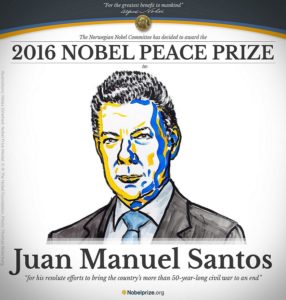The Norwegian Nobel Committee has decided to award the Nobel Peace Prize for 2016 to Colombian President Juan Manuel Santos for his resolute efforts to bring the country’s more than 50-year-long civil war to an end, a war that has cost the lives of at least 220 000 Colombians and displaced close to six million people.
About Nobel Peace Prize :
The Nobel Peace Prize is one of the five Nobel Prizes created by the Swedish industrialist, inventor, and armaments manufacturer Alfred Nobel, along with the prizes in Chemistry, Physics, Physiology or Medicine, and Literature.
- Since December 1901, it has been awarded annually to those who have “done the most or the best work for fraternity between nations, for the abolition or reduction of standing armies and for the holding and promotion of peace congresses“.
- Per Alfred Nobel’s will, the recipient is selected by the Norwegian Nobel Committee, a five-member committee appointed by the Parliament of Norway. Since 1990, the prize is awarded on 10 December in Oslo City Hall each year.
- The prize was formerly awarded in the Atrium of the University of Oslo Faculty of Law (1947–89), the Norwegian Nobel Institute (1905–46), and the Parliament (1901–04).
- Due to its political nature, the Nobel Peace Prize has, for most of its history, been the subject of controversies.
About Juan Manuel Santos,
Juan Manuel Santos Calderón is the 32nd and current President of Colombia and sole recipient of the 2016 Nobel Peace Prize.
- An economist by profession and a journalist by trade, Santos is a member of the wealthy and influential Santos family, who from 1913 to 2007 were the majority shareholders of the newspaper El Tiempo until its sale to Planeta De Agostini in 2007.
- Shortly after graduating from the University of Kansas, he joined the National Federation of Coffee Growers of Colombia as an economic advisor and delegate to the International Coffee Organization in London, where he also attended the London School of Economics and Political Science. In 1981, he was appointed deputy director of El Tiempo, becoming its director two years later.

- In 1991, he was appointed by President César Gaviria Trujillo as Colombia’s first Minister of Foreign Trade. Santos worked in expanding international trade with Colombia, and worked in creating various agencies for this purpose including: Proexport,Bancoldex and Fidu coldex. In 2000, he was appointed by President Andrés Pastrana Arango as the 64th Minister of Finance and Public Credit.
- Santos rose to prominence during the Administration of President Álvaro Uribe Vélez. In 2005, he co-founded and led the Social Party of National Unity (Party of the U), a liberal-conservative party coalition that backed the policies of President Uribe, successfully supporting his attempt to seek a Constitutional reform to be able to run for a second term.
- In 2006, after Uribe was re-elected, and the Party of the U won a majority of seats in both chambers of Congress, Santos was appointed Minister of National Defence, and continued defending the security policies of President Uribe, taking a strong and forceful stance against FARC and the other guerrilla groups operating in Colombia.
- On the 7th of October 2016, it was announced that Santos received theNobel Peace Prize for negotiating a peace treaty with the guerillas in the country, despite the unsuccessful referendum held over the deal.
- President Santos initiated the negotiations that culminated in the peace accord between the Colombian government and the FARC guerrillas, and he has consistently sought to move the peace process forward.
- Well knowing that the accord was controversial, he was instrumental in ensuring that Colombian voters were able to voice their opinion concerning the peace accord in a referendum.
- The outcome of the vote was not what President Santos wanted: a narrow majority of the over 13 million Colombians who cast their ballots said no to the accord.
- This result has created great uncertainty as to the future of Colombia. There is a real danger that the peace process will come to a halt and that civil war will flare up again.
- This makes it even more important that the parties, headed by President Santos and FARC guerrilla leader Rodrigo Londoño, continue to respect the ceasefire.
- By awarding this year’s Peace Prize to President Juan Manuel Santos, the Norwegian Nobel Committee wishes to encourage all those who are striving to achieve peace, reconciliation and justice in Colombia.
- The president himself has made it clear that he will continue to work for peace right up until his very last day in office. The Committee hopes that the Peace Prize will give him strength to succeed in this demanding task.
Furthermore, it is the Committee’s hope that in the years to come the Colombian people will reap the fruits of the ongoing peace and reconciliation process. Only then will the country be able to address effectively major challenges such as poverty, social injustice and drug-related crime.




